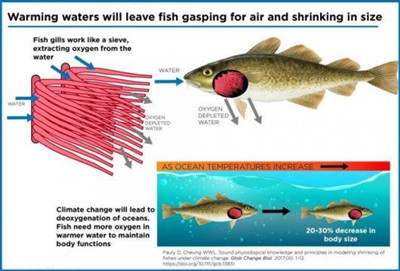This is Scientific American — 60-Second Science. I'm Christopher Intagliata.
As the world's oceans heat up, salmon are migrating earlier. Plankton are shifting their range. But warmer water temperatures also mean warmer fish—and faster-running metabolisms.
"Fish that are in water of higher temperature have a higher metabolic rate, meaning they have to consume more oxygen." Daniel Pauly, a fisheries scientist at the University of British Columbia. "Because essentially the whole metabolism, all the chemical reactions in your body, are accelerated."
So, how about growing bigger gills to allow for more oxygen intake? Pauly did the physiological math, and concluded that bigger gills just won't do the job. Because he says gills, being relatively two-dimensional, simply can't keep up with the three-dimensional growth of the rest of a fish's body.

Instead, Pauly's calculations suggest that, to feed their increasing need for oxygen, fish of all kinds may actually shrink as a result of climate change. With decreased supply, they'll need to lower demand. The study is in the journal Global Change Biology.
One more detail bears mentioning: that is the warmer water also holds less dissolved oxygen. "So the two effects, increased demand and the lowered supply are working towards making the fish smaller."
Which means future fishermen might find a lot of lower-value small fry in their nets.
Thanks for listening for Scientific American — 60-Second Science Science. I'm Christopher Intagliata.












